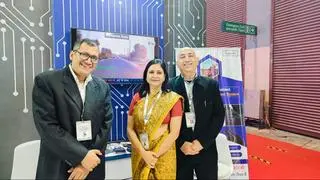Venkat Rajaraman had installed about 1.4 MW of rooftop solar panels at IIT-Madras and the IIT-M Research Park, through a solar EPC start-up that he had founded. Ashok Jhunjhunwala, Professor in the Department of Electricity Engineering, IIT-M, was questioning him on the efficiency of the devices he had installed. And, that is when, says Venkat, “we got this aha moment”.
There was a lot of conversion of electricity, from alternating current to direct current and back, resulting in so much wastage. That is when he started working on a controller that will ensure there is no conversion of electricity. “You don’t have any conversion there. You make a highly efficient and cost-effective product,” says Venkat, CEO, Cygni Energy Pvt Ltd, which he founded and has been incubated at IIT-Madras.
Decentralised powerCygni was founded in 2014 to capitalise on the increasing decentralised generation of electricity, thanks to solar power becoming popular. Distributed generation meant electricity was consumed in the place it was generated, reducing loss during transmission and distribution. Simultaneously, power electronics getting done on printed circuit boards was another game-changer, says Venkat.
On the consumption side, the appliances were getting more energy efficient; lighting is moving towards LED and gadgets — laptops and mobiles — are moving towards DC. They had batteries inside and you need an adaptor to convert the AC into DC for the batteries inside the gadgets.
“We were force-fitting AC into everything, just because AC was available,” says Venkat, an Electrical and Electronics Engineering graduate from Madurai, who went on to do his Masters in Electrical Engineering from Stanford, with specialisation in VLSI. He worked in chip design in Sun Microsystems in the US, before joining a start-up in California, which had its engineering centre in Hyderabad. This prompted his move back to India, after which he joined an inverter manufacturer, before venturing out on his own. What if everything was natively DC, that is the power source as well as the appliances that used them, asks Venkat. Is there a way we can look at it differently? Like, powering a whole building with DC? It is possible, he says. Is it cost effective? Absolutely, he adds.
Loss in energyHe explains that in generating electricity using solar panels, converting it into AC, storing it in a battery and taking it back from the battery, nearly 45 per cent of the power is lost. Again, converting the electricity on the appliances leads to further loss in energy. Cygni makes DC-based products, such as inverter-less power back-up for homes, rural power packs, DC appliances and AC-DC converters.
Cygni is electrifying 4,000 homes in Jodhpur, Jaisalmer and Bikaner districts of Rajasthan using DC solutions. Providing grid power is expensive as the homes are spread apart. The company has installed solar panels on the roofs with a storage system and it also provides each home a Brushless DC (BLDC) fan, an LED-DC tubelight, a DC bulb and a mobile charger. All the appliances consume less electricity than those that run on AC. Similarly, it has executed a solar PV-based off-grid project in a tribal hamlet in the Nilgiris in Tamil Nadu. It has also done a small project in Nigeria.
There is no reason, says Venkat, offices and commercial complexes have to run on AC, which is basically a lighting load with some electronics. Cygni has a product that caters to this segment too, providing DC-only solutions. The new buildings that are coming up at the IIT-M Research Park has DC lighting completely.
According to Venkat, Cygni has received the first tranche of ₹2 crore of a ₹10-crore Series A investment from Sasken Communication. It is using the money to ramp up production.








Comments
Comments have to be in English, and in full sentences. They cannot be abusive or personal. Please abide by our community guidelines for posting your comments.
We have migrated to a new commenting platform. If you are already a registered user of TheHindu Businessline and logged in, you may continue to engage with our articles. If you do not have an account please register and login to post comments. Users can access their older comments by logging into their accounts on Vuukle.